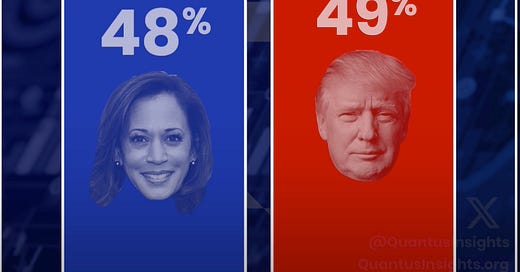Quantus Insights Final National Survey: A Dead Heat as Economic Concerns and Trust Shape Voter Sentiment
Economy and Trust Drive a Razor-Thin Race between Donald Trump and Kamala Harris
With only days left until the 2024 presidential election, our latest national survey conducted among 1,832 likely voters from October 27-30 underscores a close contest between Republican candidate Donald Trump and Democratic candidate Kamala Harris. Each candidate holds near-equal support, with Trump slightly edging out Harris by a narrow margin of 49.1% to 48.3%. The survey, commissioned by Trending Politics News, has a margin of error of ±2.4%, indicating a race that could swing in either direction as Election Day approaches.
Voter Demographics and Alignment
The survey reveals a sharply divided electorate, with respondents identifying evenly as Republicans and Democrats (36% each), and 28% aligning as Independents. A majority of Trump’s support is coming from male voters (55%), non-college-educated voters (53%), and the white demographic (57%). In contrast, Harris has strong backing among female voters (54%), college-educated voters (56%), and Black voters (80%).
Primary Issues: Economy and Immigration at the Forefront
When asked about the most critical issues facing the country, a clear majority (52%) identified the economy and jobs as their top concern. This prioritization reflects widespread economic anxiety that has defined the campaign season. Immigration ranked as the second-highest concern, cited by 45% of voters, followed by national security (7%), abortion (12%), and crime and public safety (9%).
Both candidates have attempted to position themselves as the preferred choice for handling these issues, but the survey suggests that economic confidence remains a decisive factor, with Trump marginally leading Harris in perceived trust to "oversee the economy and trade" (49% vs. 46%).
Voters' Perception of Candidate Trust and Capabilities
Trust in each candidate's leadership capability remains polarized, yet remarkably balanced. When asked whom they trust more to fulfill presidential responsibilities—protecting national borders, managing the economy, and addressing international threats—49% of respondents leaned toward Trump, compared to 46% for Harris. Voters’ sentiments on past performance also play a role: 51% approve of Trump's first term as president, while Harris has 47% backing for her record as vice president.
Impact of Controversial Statements
A potentially volatile factor in the race involves recent remarks by President Joe Biden, who labeled Trump supporters “garbage,” in a moment reminiscent of Hillary Clinton's 2016 “basket of deplorables” comment. According to the survey, 28% of respondents reported being more likely to support Trump following Biden’s statement, while 62% indicated that it had no effect on their vote.
Regional and Demographic Variations
While Trump holds a lead among rural and white non-college-educated voters, Harris maintains a strong position in urban areas and among minority groups. The candidates are virtually tied across age demographics, with Harris slightly favored by younger voters (18-29), and Trump holding a slight edge among older voters, particularly those over 45.
Conclusion
The survey’s results paint a picture of an intensely competitive race, with voter turnout and last-minute shifts in key demographics likely to determine the outcome. With the economy and trust in leadership as pivotal themes, both campaigns face a final sprint to sway undecided voters and energize their bases.




